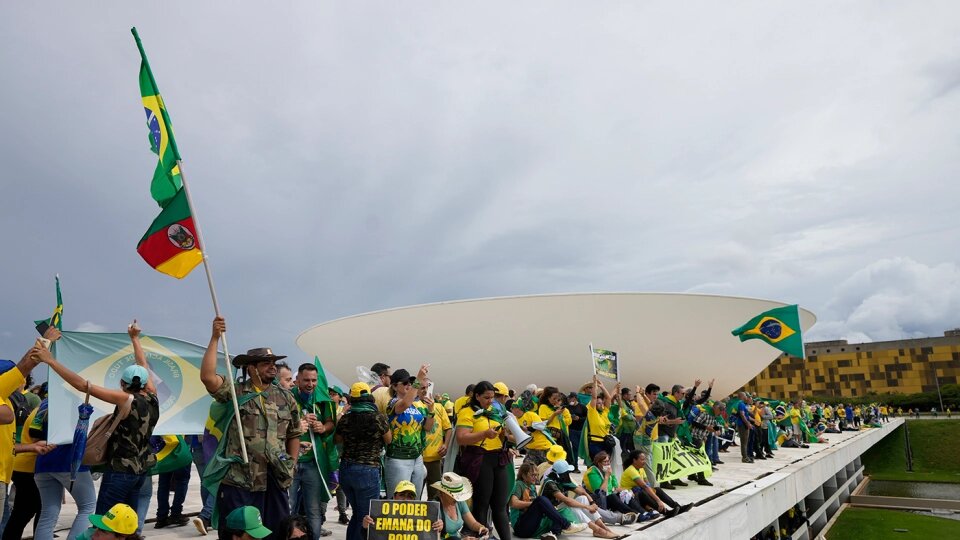
Analysis
On January 8th, 2023, thousands of supporters of former Brazilian President Jair Bolsonaro raided and vandalized the seat of power in the nation’s capital Brasilia. The supporters were violently attempting to overthrow the recent election which crowned Luiz Inacio Lula da Silva (Lula) the country’s new democratically elected president. Since his loss in the election in October, former President Bolsonaro has been spreading lies to his supporters that the election was “stolen” and “rigged”. Bolsonaro has followed in the footsteps of his ally, former U.S. President Donald Trump. Much like former President Trump, Bolsonaro encouraged his supporters to take action in overturning his country’s election results. In both countries, violent mobs breached government buildings and attempted to harm government officials. This begs the question, what does the future of democracy look like? The two articles I will be analyzing offer opinions and explanations of what the future of democracy will look like for Brazil and for the rest of the world.
The article from Yes Magazine, “What the Brazil Insurrections Means for Democracy” details the insurrection and the broader implications it had on Brazilian society. The article starts out by discussing the role of the military in the riot. Moreover, it talks about how many people in Brazil believe that the military played a role in the insurrection. Irois writes, “leading military figures have been supportive of Bolsonaro’s extreme right agenda for a long time and even recently have displayed outright support for several pro-coup demonstrations unfolding in different parts of the country in the lead-up to the attack” (Irois, January 9th, 2023). Moreover, Irois explains that in his opinion, the riot could not be considered a “coup” but the fact that military officials were involved in the insurrection is concerning. The article goes on to talk about what the riot means for the future of Brazilian democracy. The article explains that Brazil is at “crossroads” because almost half the country voted for former President Bolsonaro despite his reputation of democratic backsliding. Recently inaugurated President Lula did win the election, which may indicate that Brazilians are looking to rebuild democratic institutions in the country. Overall, this article does a good job of explaining the significance of the insurrection and the implications it had on the future of Brazil and its fledgling democracy.
The article from the Time Magazine, “What Brazil’s Failed Coup Means for the Future of Its Democracy” explains in depth about the military’s role in the insurrection. The article details how the ultimate goal of the insurrection was to put power in the hands of the military. Serhan writes, “This was clearly a bold-faced attempt to ask the military to intervene and to trash the institutions of democracy by doing so”( Serhan, January 9th, 2023). The article also mentions former President Bolsonaro’s military history and how a lot of his regime has a military background. The article also goes into detail about how even after the insurrection, Bolsonaro still has massive political capital and much like the former U.S. President Donald Trump. Many experts agree this is worrisome because it could mean that there is a chance for this type of violence again. The article concludes by explaining how the “attempted coup” will permanently remain a shadow on Brazilian democracy. Serhan details how the “attempted coup” was scary for many Brazilian citizens because it reminds them of the coup in Brazil that occurred in 1964.
The first and most important way these two articles differ is in their approach to defining the insurrection. The Yes Magazine article was very skeptical about calling the insurrection a coup. The article did not consider the insurrection a flat out coup because there were not enough military personnel involved in it to merit calling it a coup. In contrast, the Time Magazine article called the riot an “attempted coup”. The Time Magazine article argues that because former President Bolsonaro has a military history and that he included many former military officers in his cabinet, the insurrection should be considered a coup. This article also mentions that people were looking to put power into the hands of the military, which might appear somewhat contradictory considering it was civilians who raided the government buildings. But much like Trump’s loyalists, they are very pro-military. I believe that the distinction between these two articles is important because throwing around the word “coup” is serious. Coup d’etats are common in world history and have posed threats to standing democracies but also at times have attempted to restore a democracy. The term should be used very carefully and not casually suggested.
The first way this story relates to course themes is through our readings and discussions about government stability. We have read about how after the colonial period and independence revolutions, many Latin American countries had trouble forming stable government institutions. These articles prove that there is still trouble with maintaining stable governments over long periods of time. Just like in early Latin America, there is still election fraud, authoritarian regimes and violence. The second way this historic event relates to course themes is through our readings about social hierarchies. The two articles I read didn’t talk a lot about this concept, however, many rich corporations supported the insurrection because Bolsonaro gave them tax breaks and helped them maintain their wealth. Moreover, Bolsonaro’s regime did not favor social progress and mainly supported the one percent who were in power and control.
Sources
https://time.com/6245795/brazil-bolsonaro-lula-trump-insurrection/
https://www.yesmagazine.org/democracy/2023/01/09/brazil-coup-bolsonaro